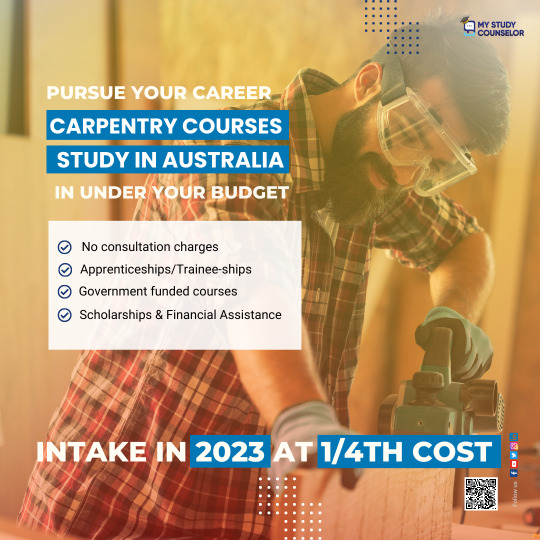#carpentry course for international students
Explore tagged Tumblr posts
Text
General English Program, Beginner to Advanced Level English Courses in Melbourne
Orange College offers a General English course in Melbourne CBD, Victoria. Our program will help you develop all the aspects of the English language, such as reading, writing, speaking, listening, grammar, and pronunciation.
#carpentry courses in melbourne for domestic students#carpentry courses in melbourne for international students#carpentry courses melbourne for international students#Beginner to Advanced Level English Courses in Melbourne#certificate iii in cabinet making melbourne#certificate 3 in cabinet making melbourne#Beginner English Courses in Melbourne#Advanced Level English Courses in Melbourne#painting and decorating course melbourne#Advanced English Courses in Melbourne#diploma of leadership and management melbourne for international students#carpentry course melbourne#cabinet maker course melbourne#carpentry course for international students#General English Courses Melbourne#General English Program Melbourne#certificate iii in carpentry course#diploma in leadership and management melbourne#certificate iii in painting and decorating#diploma of leadership and management melbourne#certificate 3 painting and decorating#Certificate III in Cabinet Making and Timber Technology#leadership and management courses melbourne#building and construction courses melbourne#diploma of leadership and management for international students#MSF30322#MSF30322 Cabinet Making#MSF30322 Certificate III in Cabinet Making#carpentry certificate iii course#certificate iv in building and construction
0 notes
Text
How Trade Courses in Australia Help You Become Job-Ready

In today's world, skills matter more than ever. Employers are looking for practical knowledge, not just degrees. That's why trade courses in Australia are becoming so popular. These courses are designed to make you job-ready from day one.
Australia has a strong demand for skilled workers in many trades. Whether it's construction, electrical work, plumbing, or hairdressing, there's a place for you. These courses are practical, affordable, and lead to real careers. You don't have to wait four years to start working. With the right course, you can begin earning sooner than you think.
In this blog, we'll show you how trade courses prepare you for the workforce. We'll explain what they are, what benefits they offer, and why now is the perfect time to enrol.
What Are Trade Courses?
Trade courses in Australia are hands-on training programs that provide practical experience. They teach you specific skills needed for a particular job. These are also known as vocational or technical courses.
You can take these courses in many fields, such as:
Carpentry
Plumbing
Electrical
Automotive
Hospitality
Hair and Beauty
Metal fabrication
Aged care and childcare
These programs are usually offered by TAFEs (Technical and Further Education) and private training colleges. Some last for a few months, while others take a year or two.
You'll learn through a mix of classroom study and on-the-job training. This gives you the confidence to work in real-world situations.
Why Choose Trade Courses?
There are many reasons to choose trade courses in Australia. Here are some key benefits:
1. Faster Entry into the Workforce
Unlike university degrees, trade courses are shorter. You can start working in just 6 to 24 months. This means you begin earning sooner. It's a fast track to a successful career.
2. Hands-On Learning
Trade courses focus on practical skills. You don't just learn from books—you learn by doing. This makes it easier to understand and apply your knowledge.
3. High Demand for Skilled Workers
Australia is facing a shortage of skilled trade workers. This includes electricians, plumbers, aged care workers, and more. That means better job opportunities and job security.
4. Affordable Education
These courses cost less than university degrees. There are also government subsidies and payment plans available. So, it's a wise financial choice.
5. Pathways to Migration
Many trade courses in Australia are listed on the Skilled Occupation List. That means international students can use them as a pathway to permanent residency.
How Trade Courses Make You Job-Ready
Here's how these programs prepare you to succeed in the real world:
1. Industry-Relevant Curriculum
The content is developed in collaboration with industry experts. This ensures you're learning what employers want. You won't waste time on unnecessary theory.
2. Work Placement Experience
Most trade courses include internships or work placements. You'll work alongside experienced professionals. This helps you gain confidence and build your resume.
3. Certification and Licenses
Completing a trade course gives you nationally recognised qualifications. For example, Certificate III in Carpentry or Certificate IV in Automotive. These credentials are essential for obtaining a license and securing employment.
4. Job Interview Preparation
Many institutions offer career services. These include mock interviews, resume writing, and job search support. So, you walk into your first interview fully prepared.
5. Strong Industry Links
Training providers often have partnerships with companies. This increases your chances of being hired straight after completing your course.
Popular Trade Courses to Consider
Here are some of the most in-demand trade courses in Australia:
1. Certificate III in Carpentry
Ideal for those who love working with their hands. You'll learn how to construct walls, roofs, doors, and more.
2. Certificate III in Electrotechnology (Electrician)
This course prepares you to install and repair electrical systems. It's one of the highest-paid trades in Australia.
3. Certificate III in Plumbing
Plumbers are always in demand. This course covers drainage systems, water supply, and gas fitting.
4. Certificate IV in Automotive Mechanical Diagnosis
This course trains you to diagnose and repair vehicle issues. It's perfect for those passionate about cars.
5. Certificate III in Hairdressing
You'll learn cutting, styling, and colouring techniques. It's a creative trade with plenty of room for self-employment.
Who Can Take Trade Courses?
Trade courses in Australia are open to:
Local students
International students
School leavers
Career changers
Mature-age students
You don't need high grades or previous experience. What matters is your willingness to learn.
If you're an international student, check the course's CRICOS registration to ensure it's approved for overseas students.
How to Enrol in a Trade Course
Enrolling in a trade course is simple:
Choose a Course – Pick one that matches your interests and career goals.
Select a Provider – Compare TAFEs and private colleges.
Check Entry Requirements – Some courses need basic English or maths skills.
Submit Your Application – Fill out the form online or in person.
Arrange Funding – Look into government support, payment plans, or scholarships.
Once you're enrolled, get ready for a journey that can change your life.
Career Opportunities After Graduation
After completing trade courses in Australia, you can:
Start working immediately
Open your own business.
Apply for apprenticeships
Continue with advanced certifications.
Apply for skilled migration visas (for eligible trades)
The career growth is steady. Skilled trades are well-paid and respected. With experience, you can move into supervisory roles or even become a trainer.
Final Thoughts
Trade courses in Australia offer a practical, affordable, and fast path to employment. Whether you're just starting or switching careers, they give you real-world skills that employers value. With high demand across various industries, there's never been a better time to enrol. Don't wait. Your future in a skilled trade starts with the first step—a quality trade course.
0 notes
Text
BMS Architecture College, Bangalore: A Leading Center for Future Architects

BMS Architecture College (BMSCA), nestled in the culturally vibrant district of Basavanagudi, Bengaluru, shines brightly as a pillar of architectural education in India. Founded in 1980 as a part of BMS College of Engineering, it transitioned into an autonomous institution in 2016. Linked with Visvesvaraya Technological University (VTU) and sanctioned by the Council of Architecture (CoA), BMSCA has persistently cultivated creativity and promoted advancement in architecture.
Academic Offerings:
BMS Architecture College presents a diverse array of programs catering to varied academic pursuits:
Bachelor of Architecture (B.Arch): A five-year undergraduate course concentrating on design, theory, and practical implementation.
Master of Architecture (M.Arch) in Habitat Design: A postgraduate program centered on sustainable and livable environments.
Bachelor of Design (B.Des) in Interior Design: An undergraduate course committed to understanding the intricacies of interior spaces.
Bachelor of Planning (B.Plan): An undergraduate program focused on urban and regional planning.
Doctoral Programs (Ph.D.): Research opportunities across numerous architectural fields.
Campus and Facilities:
Covering 2.3 acres, the BMSCA campus is outfitted with modern facilities:
Studios and Laboratories: Sophisticated labs equipped with laser cutting machines, 3D printers, and environmental assessment devices like wind gauges and light intensity meters.
Workshops: Carpentry and model-making workshops that offer practical experience.
Library: A well-resourced compendium of architectural books and digital assets.
Hostels and Cafeteria: Comfortable living and dining quarters for students.
Sports Amenities: Fields and courts for various athletic endeavors.
Faculty and Research:
BMS Architecture College is proud of its accomplished faculty, experts in their fields. The institution fosters research and innovation, offering students chances to partake in projects tackling real-world dilemmas. The doctoral programs further emphasize the college's dedication to enhancing architectural understanding.
Student Achievements and Alumni:
The college boasts of its students' successes:
Harish Karthick V, a ninth-semester student, attained an internship at the esteemed Bjarke Ingels Group (BIG) in Copenhagen as a Sustainability Assistant.
Ar. Dinesh Prasad, a graduate, was celebrated as the Best Outgoing Student in 2021 by the Indian Institute of Architects (IIA).
Notable alumni include:
Ar. Bijoy Ramachandran: Director at Hundred Hands, Bangalore.
Ar. Anup Naik: Director at Space Matrix, Bangalore.
Ar. Sameera Chukkapalli: Founder and Director of Needlab, Barcelona, Spain.
Ar. Milana M V: Founder and Principal Architect at Vivospace Design Studio, Bangalore.
Ar. Shivi Sharmaa: Project Manager at Morphogenesis, Delhi.
Campus Experience and Diversity:
BMSCA encourages a dynamic campus atmosphere with a variety of co-curricular and extracurricular activities. The institution underscores diversity and inclusion, reflected in its student composition:
Gender Ratio: Approximately 34% male and 66% female students.
Regional Diversity: A blend of students from various states, comprising a 28:72 inter-state to intra-state ratio.
Location and Accessibility:
Situated on Bull Temple Road in Basavanagudi, BMS Architecture College lies roughly 40 kilometers from Kempegowda International Airport. The college's advantageous location provides convenient access to Bengaluru's architectural landmarks and career opportunities.
Conclusion:
BMS Architecture College in Bangalore embodies distinction in architectural education through its comprehensive academic offerings, cutting-edge infrastructure, and commitment to research and innovation. Its prime location and lively campus life further enrich the student experience, establishing it as a top choice for aspiring architects.
0 notes
Text
Compassion International Review-Vocational Training and Skill Development: Giving Children a Future

Empowering children with practical skills is essential in breaking the cycle of poverty. Compassion International is committed to providing vocational training and skill development programs that equip children and young adults with the tools they need to build sustainable careers. Through these initiatives, Compassion International ensures that children from underprivileged backgrounds can secure a stable and self-sufficient future.
Compassion International: Equipping Children with Practical Skills
For many children in poverty, traditional education may not be the only path to success. Vocational training offers an alternative route to employment, enabling students to learn hands-on skills that are in demand in their communities. Compassion International provides training in fields such as carpentry, tailoring, computer literacy, and entrepreneurship, giving children the confidence and ability to earn a livelihood.
Compassion India: Creating Employment Opportunities
In Compassion India, vocational training programs are making a significant impact on young lives. With the support of Compassion International India, students receive professional training that helps them secure jobs, start small businesses, or pursue specialized careers. By focusing on skill development, these programs address unemployment and provide young people with a sense of purpose and direction.
How Compassion International Supports Vocational Training
Providing Industry-Relevant Training Compassion International offers skill-based courses that align with job market demands, ensuring that children receive training in fields that offer employment opportunities.
Encouraging Entrepreneurship Through Compassion International India, students learn business management, financial literacy, and entrepreneurial skills, empowering them to start their own ventures.
Mentorship and Career Guidance Many Compassion International Reviews highlight how mentorship programs have helped students navigate career paths and gain the confidence to pursue their goals.
Success Stories: From Training to Employment
The impact of Compassion International is evident in the countless success stories of young individuals who have gained independence through vocational training. Testimonials in Compassion International Reviews showcase how children who once had limited opportunities have now secured jobs, started businesses, and become financially stable, all thanks to the skill development programs.
Conclusion: Building a Future Through Skills
The work of Compassion International goes beyond providing education—it is about equipping children with the skills needed to lead self-sufficient lives. Whether through Compassion India or global initiatives, vocational training programs empower young people to rise above poverty and create meaningful careers.
By supporting Compassion International, sponsors and donors play a crucial role in shaping the futures of these children. Together, we can give them the skills, confidence, and opportunities they need to build a brighter tomorrow.
#compassion international#compassion india#compassion international review#compassion international india#compassion international reviews
0 notes
Text

10 Best PR Courses in Australia in 2025: Eligibility and Point System Explained
Australia remains one of the top destinations for international students seeking permanent residency (PR) through education. If you're planning to study in Australia and aim for PR, choosing the right course is crucial. In 2025, certain courses continue to provide strong PR pathways based on Australia’s point-based immigration system.
Why Choose PR Courses in Australia?
✅ High employability in Australia’s growing industries ✅ Pathway to a Temporary Graduate Visa (subclass 485) ✅ Opportunity to gain PR points through skilled occupation lists ✅ Quality education and global career prospects
Top 10 PR Courses in Australia for 2025
Nursing – High demand and multiple PR pathways
Engineering (Civil, Mechanical, Electrical, Software) – Featured on the skilled occupation list
IT & Computer Science – Strong job market and PR prospects
Teaching (Early Childhood & Secondary Education) – Critical skill shortage area
Accounting – Continues to be a PR-friendly option
Social Work – High demand for skilled professionals
Automotive & Trade Courses – Includes carpentry, plumbing, and electrical work
Eligibility Criteria for PR Courses
📌 Admission into these programs typically requires:
A high school diploma or bachelor's degree (depending on the course level)
Proof of English proficiency (IELTS/PTE, though some waivers exist)
Relevant work experience for specific courses (optional but beneficial)
Understanding the PR Point System
To qualify for PR, candidates must earn at least 65 points based on factors like: ✔ Age – Maximum points (30) for ages 25-32 ✔ Education – Higher degrees earn more points ✔ Work Experience – More experience equals more points ✔ English Proficiency – High PTE/IELTS scores boost points ✔ State Nomination/Regional Study – Additional PR points
Final Thoughts
Studying a PR-friendly course in Australia can open doors to a long-term career and residency. If you're considering this pathway, research your options, plan strategically, and maximize your PR points!
👉 Thinking of applying? Let’s discuss in the comments! #StudyInAustralia #PRPathway #Scholarships #InternationalStudents
0 notes
Text
Best Career Paths for International Students in Australia

Australia is a popular destination for international students, offering world-class education and promising career prospects. Many students choose to stay in the country after graduation to take advantage of its strong job market and diverse industries. Understanding the best career paths can help international students plan their future effectively.
1. Healthcare and Nursing
The healthcare industry in Australia is thriving, with an increasing demand for skilled professionals. Roles in nursing, aged care, and allied health services offer excellent employment opportunities. Graduates in nursing and medical fields can find employment in hospitals, clinics, and private healthcare facilities. Additionally, the government provides incentives for healthcare professionals willing to work in regional areas.
2. Information Technology (IT)
Australia’s tech industry is expanding rapidly, creating a high demand for IT professionals. Careers in software development, cybersecurity, data science, and artificial intelligence (AI) are among the most sought-after. International students with IT-related degrees can explore employment opportunities in major cities like Sydney and Melbourne, where many global tech companies operate.
3. Engineering
Australia’s infrastructure development and mining industries drive the demand for engineers. Civil, mechanical, electrical, and mining engineers are particularly in demand. Engineering graduates can benefit from government-backed migration programs, making it easier to secure permanent residency.
4. Accounting and Finance
The financial sector in Australia offers rewarding career opportunities for international students with degrees in accounting, finance, and business analytics. Certified accountants and financial analysts are highly sought after, and many companies support skilled migrants in obtaining necessary certifications such as CPA Australia.
5. Education and Teaching
Australia values qualified educators, particularly in early childhood education and special needs teaching. International students who complete teaching degrees and obtain relevant certifications can find employment opportunities in schools and educational institutions. The government actively supports skilled teachers through various visa programs.
6. Hospitality and Tourism Management
With Australia being a top travel destination, the hospitality and tourism industry provides a wide range of job opportunities. Careers in hotel management, event planning, and culinary arts are ideal for international students looking for dynamic work environments. Part-time jobs in this sector also help students gain work experience while studying.
7. Trades and Construction
Australia has a significant shortage of skilled workers in trades such as carpentry, plumbing, and electrical work. International students pursuing vocational education and training (VET) courses in these fields can find stable and well-paying jobs. The construction industry is expected to grow, offering long-term career opportunities.
8. Agriculture and Environmental Science
With vast agricultural lands and a growing focus on sustainability, careers in agribusiness, environmental science, and horticulture are increasingly viable. Graduates in these fields can explore opportunities in farming, research, and conservation projects, especially in rural and regional areas.
Navigating Career Opportunities in Australia
International students should take advantage of career opportunities in Australia by networking, gaining local work experience, and applying for post-study work visas. Australia’s skilled migration programs also offer pathways to permanent residency, making it an attractive destination for career growth.
By choosing the right career path and staying updated on industry trends, international students can build successful futures in Australia. Whether in healthcare, IT, finance, or hospitality, the opportunities are abundant for those willing to explore and adapt.
0 notes
Text
New Guidelines for Bagless Days: Making Learning Fun and Practical for Classes 6-8
The Union Ministry of Education has unveiled new guidelines aimed at making learning more joyful and practical for students in Classes 6 to 8. Announced on the fourth anniversary of the National Education Policy (NEP) 2020, these guidelines introduce the concept of “bagless days” to enhance students’ learning experiences.

What Are Bagless Days?
Starting this academic year, students in Classes 6–8 will experience a 10-day period where they won’t carry their school bags. Instead, they will engage in hands-on learning by interning with local vocational experts such as carpenters, gardeners, potters, and more. This initiative is designed to bridge the gap between theoretical knowledge and practical skills, helping students explore various vocational crafts and potential career paths.
Key Highlights of the Guidelines
Integration into Curriculum: The bagless days are meant to be an integral part of the curriculum, not just an addition. The aim is to reduce the boundary between bookish knowledge and real-world application.
Vocational Exposure: Students will participate in practical courses that offer a survey and hands-on experience of important vocational skills. Activities might include carpentry, gardening, metal work, pottery, and other crafts tailored to local and state needs.
Flexible Scheduling: Schools can schedule these 10 bagless days across the academic year, ideally spreading them over two or three slots. This flexibility allows for the integration of both indoor and outdoor activities, depending on the school’s annual work plan.
Suggested Activities
The guidelines include a variety of engaging activities such as:
Visits to vegetable markets and charity organizations
Surveys and report writing on topics like pet care
Creative activities such as doodling, kite making, and flying
Organizing book fairs and visiting biogas plants and solar energy parks
These activities are designed to offer practical learning experiences that extend beyond traditional classroom settings.
Additional Initiatives
On the NEP anniversary, several other educational initiatives were also launched, including:
Dedicated TV channels for learning various Indian languages
Tamil language learning resources
Career guidance guidelines and mentoring programs
National Professional Standards for Teachers in braille and audiobooks
A school innovation marathon by AICTE
Books and lecture notes promoting Indian knowledge systems
Union Education Minister Dharmendra Pradhan highlighted that the NEP 2020 aims to bring transformative changes to the education system. He emphasized that these changes are crucial for nurturing a new generation of learners, harnessing the country’s demographic dividend, and driving socio-economic development.
The newly introduced bagless days are a step towards making education more experiential, engaging, and relevant, helping students connect their academic learning with real-world skills.
0 notes
Text
Carpentry Course for International Students
Enroll in our Carpentry Course for International Students to gain hands-on experience and valuable skills for a successful career in carpentry. Contact us today to know the complete process: +61451480917.

0 notes
Text
Trade Courses in Australia
Australia offers a wide range of trade courses for individuals interested in pursuing vocational education and training. These courses are designed to provide practical skills and knowledge in specific trades, preparing students for careers in various industries. Here are some common trade courses offered in Australia:

Certificate III in Carpentry: This course teaches the fundamental skills and knowledge required to work as a carpenter in the construction industry. Students learn about construction techniques, interpreting plans, and using carpentry tools.
Certificate III in Plumbing: Plumbing courses cover essential skills needed for plumbing work, including installing and maintaining piping systems, gasfitting, drainage systems, and understanding plumbing regulations.
Certificate III in Electrotechnology Electrician: This course focuses on electrical systems and provides training in installing, maintaining, and repairing electrical systems in residential, commercial, and industrial settings.
Certificate III in Automotive Mechanics: Automotive courses cover the repair and maintenance of vehicles. Students learn about diagnosing and repairing mechanical and electrical faults in various types of vehicles.
Certificate III in Hairdressing: Hairdressing courses provide training in hairstyling, cutting, coloring, and salon management. Students gain practical skills and knowledge in the latest hairdressing techniques.
Certificate III in Commercial Cookery: Aspiring chefs can enroll in commercial cookery courses to learn culinary skills, food safety, menu planning, and kitchen management. These courses prepare students for careers in restaurants, hotels, and catering services.
Certificate III in Early Childhood Education and Care: This course is suitable for individuals interested in working in childcare centers. It covers topics such as child development, educational programming, and ensuring the well-being of children.
Certificate III in Aged Care: Aged care courses train students to work in the aged care sector, providing support to elderly individuals in residential care facilities or home settings. Students learn about health and safety, communication skills, and caring for older adults.
Certificate III in Individual Support (Disability): This course focuses on supporting individuals with disabilities. Students learn about disability rights, communication strategies, and providing personalized care to people with diverse needs.
Certificate III in Horticulture: Horticulture courses cover plant care, landscaping, garden design, and sustainable practices. Graduates can pursue careers as horticulturists, gardeners, or landscape designers.
Certificate III in Wall and Floor Tiling: Tiling courses teach students how to prepare surfaces, apply adhesives, and install tiles on walls and floors. This trade is essential in the construction and renovation industries.
Certificate III in Engineering - Fabrication Trade: This course focuses on metal fabrication skills, including welding, cutting, and shaping metal components. Graduates can work in industries related to metal fabrication and engineering.
Also Read: As an international student, considering pursuing trade courses in Australia will be the best career choice. Moreover, Australia has long been a preferred destination for international students seeking high-quality education and a vibrant cultural experience.
These are just a few examples of the trade courses available in Australia. The country has a well-established vocational education and training system, and institutions like TAFE (Technical and Further Education) institutes offer a wide array of trade courses tailored to industry needs. Students interested in pursuing these courses can explore options at TAFE institutions, private colleges, and registered training organizations across the country.
0 notes
Text
Best Course to Study in Canada for PR

Canada is not only known for its stunning natural beauty and welcoming multicultural society but is also celebrated for its generous immigration policies. Thousands of international students flock to Canada each year with the dream of obtaining permanent residency. To maximize your chances of achieving this dream, it's essential to choose the right course that aligns with the country's economic and labor market needs. In this article, we'll explore some of the best course to study in Canada for PR those aiming to secure a Permanent Residency.
1. Information Technology and Computer Science
The technology sector in Canada is thriving, with a high demand for skilled professionals. Studying courses related to information technology and computer science, such as software development, data science, and cybersecurity, can open up a plethora of job opportunities. Canadian cities like Toronto, Vancouver, and Montreal are tech hubs, offering excellent prospects for IT graduates.
2. Nursing and Healthcare
Canada's healthcare system requires a constant influx of qualified healthcare professionals. Nursing, medicine, and allied health courses offer promising career prospects. The country's aging population ensures a sustained demand for healthcare services, making these fields highly sought after.
3. Engineering
Engineering graduates are in high demand in Canada, with a strong focus on civil, mechanical, electrical, and software engineering. The country's infrastructure projects and the growth of the technology sector drive the need for engineering professionals.
4. Business and Management
Canada's thriving business environment offers a wide range of opportunities for graduates with business and management degrees. Business administration, finance, and marketing are popular choices. Learning both official languages, English and French, can further enhance your employability.
5. Environmental Sciences and Renewable Energy
As Canada prioritizes sustainability and environmental protection, studying courses in environmental sciences, renewable energy, or sustainability can lead to rewarding career opportunities. The government is investing in green initiatives, making it an excellent choice for future job prospects.
6. Trades and Skilled Labor
Skilled trades such as plumbing, carpentry, welding, and electrical work are in constant demand in Canada. These professions often lead to well-paying jobs, and with the right credentials and experience, PR can be achieved relatively quickly.
7. Education
Canada's educational system values quality teaching and is continuously in need of educators. Studying education-related courses, such as early childhood education, primary and secondary school teaching, or higher education administration, can lead to fulfilling careers.
8. Agriculture and Agri-Food
Canada's agricultural sector is vast and diverse, offering career opportunities in agriculture, agribusiness, and food science. As a country with an increasing focus on sustainability and organic farming, these fields are of growing importance.
9. Creative Arts and Design
Canada's entertainment and creative industries are vibrant and expanding. Fields like film, media, animation, graphic design, and performing arts offer promising career options. Major cities like Toronto and Vancouver serve as hubs for the creative arts.
10. Language Studies and Translation
With Canada's multicultural landscape and bilingualism (English and French), language skills and translation services are in demand. Courses in linguistics, translation, and language education can provide opportunities in various industries.
Conclusion
Choosing the best course to study in Canada for PR is a crucial step toward securing a Permanent Residency. It's important to align your interests and skills with the country's economic and labor market needs. The courses mentioned in this article are some of the best options to consider, but it's essential to research and make an informed decision based on your personal and career goals. Moreover, staying up-to-date with the latest immigration policies and requirements is crucial for a successful Canada PR application. Canada's welcoming environment and strong economy make it an attractive destination for those seeking permanent residency through education and employment.
0 notes
Text
Maximizing Your Investment — Why a Certificate III in Cabinet Making is Worth It in Melbourne

1. High Demand for Skilled Cabinet Makers
Trend: Melbourne is experiencing a boom in both residential and commercial construction, leading to a high demand for skilled tradespeople, including cabinet makers.
Benefit: By earning a Certificate III in Cabinet Making, you position yourself in a field with strong job prospects and consistent demand for skilled labour.
2. Comprehensive Skill Development
Content: The Certificate III in Cabinet Making program covers a wide range of skills, including design, construction, installation, and finishing of cabinetry. It also includes training in the use of advanced tools and machinery.
Benefit: This comprehensive training ensures you are well-prepared for various tasks and challenges in the industry, making you a versatile and valuable employee.
3. Hands-On Experience
Content: The program emphasizes practical, hands-on experience through workshops and real-world projects. This practical approach is essential for mastering the craft of cabinet making.
Benefit: Gaining hands-on experience during your training ensures that you are job-ready and can confidently handle tasks from day one in a professional setting.
4. Access to Modern Technology
Content: Students at Orange College have access to state-of-the-art facilities and equipment, including Computer-Aided Design (CAD) software and CNC machines.
Benefit: Familiarity with modern technology not only enhances your skill set but also makes you more competitive in the job market, where such expertise is increasingly sought after.
5. Pathway to Specializations
Content: The Certificate III in Cabinet Making provides a solid foundation for further specialization in areas such as custom furniture design, kitchen and bathroom cabinetry, and commercial fit-outs.
Benefit: Specializing can open up higher-paying and more specialized job opportunities, allowing you to tailor your career to your interests and strengths.

6. Strong Industry Connections
Content: Orange College has established connections with industry professionals and companies, providing students with opportunities for networking, internships, and job placements.
Benefit: These connections can be invaluable for securing employment after graduation and for ongoing professional development.
7. Entrepreneurial Opportunities
Content: The skills learned in Certificate III in Cabinet Making can also be applied to starting your own business, whether it’s a custom cabinetry shop or a restoration service.
Benefit: For those with an entrepreneurial spirit, this certification provides the knowledge and skills needed to successfully run your own business, offering greater control over your career and income.
8. Competitive Earning Potential
Trend: Skilled cabinet makers in Melbourne can command competitive salaries, with opportunities for increased earnings through specialization and experience.
Benefit: Investing in your education with a Certificate III Can lead to a financially rewarding career, providing a strong return on investment over time.
9. Job Satisfaction and Creativity
Content: Cabinet-making is a profession that combines creativity with practical skills, allowing you to see tangible results from your work.
Benefit: Many cabinet makers find great satisfaction in their craft, as it allows for creative expression and the creation of beautiful, functional pieces that clients appreciate.
10. Supportive Learning Environment
Content: Orange College offers a supportive and inclusive learning environment, with experienced instructors who are dedicated to student success.
Benefit: The college’s commitment to providing quality education and support ensures that you have the resources and guidance needed to excel in your studies and future career.
Investing in a Certificate III in Cabinet Making at Orange College is a smart choice for those looking to enter a stable and rewarding profession. The skills, experience, and industry connections you gain will maximize your career potential and provide a strong foundation for future success in Melbourne’s dynamic trades industry.
#carpentry courses in melbourne for domestic students#carpentry courses in melbourne for international students#carpentry courses melbourne for international students#Beginner to Advanced Level English Courses in Melbourne#certificate iii in cabinet making melbourne#certificate 3 in cabinet making melbourne#Beginner English Courses in Melbourne#Advanced Level English Courses in Melbourne#painting and decorating course melbourne#Advanced English Courses in Melbourne#diploma of leadership and management melbourne for international students#carpentry course melbourne#cabinet maker course melbourne#carpentry course for international students#General English Courses Melbourne#General English Program Melbourne#certificate iii in carpentry course#diploma in leadership and management melbourne#certificate iii in painting and decorating#diploma of leadership and management melbourne#certificate 3 painting and decorating#Certificate III in Cabinet Making and Timber Technology#leadership and management courses melbourne#building and construction courses melbourne#diploma of leadership and management for international students#MSF30322#MSF30322 Cabinet Making#MSF30322 Certificate III in Cabinet Making#carpentry certificate iii course#certificate iv in building and construction
0 notes
Text
Canada’s PR Dream: Choosing the Best Study Course
Canada has long been a favoured destination for individuals seeking a better life and permanent residency (PR) in a country known for its welcoming environment and high quality of life. For many, studying in Canada is a stepping stone toward achieving this dream. In this article, we’ll explore the journey to Canadian PR and offer guidance on how to choose the Best Course to Study In Canada for PR to help make this dream a reality.

Understanding the Canadian PR Pathway
Obtaining Canadian PR status is a significant achievement and offers numerous advantages, including access to social services, healthcare, and the ability to live and work anywhere in the country. One primary pathway to PR is through the Express Entry system. Under this system, various factors such as qualifications, age, work experience, and language proficiency are assessed, and having Canadian education can greatly enhance your chances.
Choosing the Right Study Course
Selecting the Best Course to Study In Canada for PR is a critical step on your journey to Canadian PR. It’s not merely about enrolling in any program; it’s about choosing a course that aligns with your long-term objectives and bolsters your PR prospects.
1. Identify Your Career Goals
The first step in selecting the right study course is to identify your career goals. Consider the field you intend to work in after completing your studies. Whether it’s information technology, healthcare, engineering, or business, your course should be a bridge to your dream job.
2. Research In-Demand Professions
To increase your chances of PR, it’s wise to choose a study course that corresponds to the current demand in the Canadian job market. Research in-demand professions in Canada, which usually include jobs in healthcare, technology, engineering, and skilled trades. Courses related to these fields often offer the best prospects.
3. Check Provincial Nomination Programs
Canada is divided into various provinces, each with its own nomination programs. These programs can provide additional PR opportunities. Investigate which provinces align with your course and career aspirations. For instance, if you’re interested in a healthcare career, provinces like Ontario and British Columbia might be excellent choices.
4. Language Proficiency
Language proficiency plays a crucial role in the Express Entry system. Courses that require English or French proficiency can be advantageous. Additionally, improving your language skills while studying can give you an edge in the Express Entry pool.
5. Seek Guidance from Immigration Experts
If you’re unsure about course selection, consider consulting with immigration experts or educational consultants. They can offer insights into the best options based on your qualifications, background, and goals.
Popular Study Courses for PR
Here are some study courses that are often favored by international students aiming for Canadian PR:
1. Nursing and Healthcare Programs
The healthcare sector in Canada has a high demand for professionals. Courses such as nursing, medical technology, and pharmacy technician programs can lead to promising career opportunities.
2. Information Technology and Computer Science
Canada’s technology sector is thriving. IT-related courses like software engineering, data science, and computer programming are highly sought after.
3. Engineering and Applied Sciences
Engineering courses like civil, mechanical, or electrical engineering can open doors to Canada PR opportunities. The demand for skilled engineers remains high in Canada.
4. Business and Management
Management and business administration courses are popular choices. Business professionals are always in demand, and these courses offer a broad range of career opportunities.
5. Skilled Trades
Skilled trades like plumbing, welding, and carpentry can also lead to PR. These professions are essential for Canada’s infrastructure development.
6. Language and Literature Studies
If you wish to improve your language skills and explore careers related to language and literature, there are programs available that can help you achieve both.
Applying for Admission
Once you’ve chosen the right study course, you’ll need to apply to Canadian colleges or universities. Ensure you meet their admission requirements, including academic qualifications and language proficiency tests.
1. Tuition Fees and Scholarships
Consider your budget when selecting a course. Tuition fees can vary significantly, and scholarships may be available for international students. Explore scholarship opportunities to ease the financial burden.
2. Application Process
Follow the application process for your chosen institution diligently. Pay attention to deadlines and required documents like transcripts, recommendation letters, and proof of funds.
Studying in Canada
Studying in Canada is not just about academics; it’s also a chance to experience a rich cultural exchange. You’ll have the opportunity to meet people from diverse backgrounds and explore the stunning Canadian landscapes.
1. Work While Studying
Canadian student visas often allow you to work part-time during your studies. This can help cover your living expenses and gain valuable work experience.
2. Post-Graduation Work Permit
Upon completing your studies, you may be eligible for a post-graduation work permit (PGWP), which allows you to work in Canada for up to three years. This post-graduation work experience can be a stepping stone to PR.
3. Language Proficiency
While studying, make an effort to improve your language skills. Many colleges and universities offer language courses to help you become proficient in English or French.
Applying for Permanent Residency
Once you have successfully completed your studies and gained the necessary work experience, you can apply for Canadian PR through the Express Entry system. The Canadian Experience Class (CEC) is a popular immigration program for those with Canadian education and work experience.
1. Meeting Eligibility Criteria
To qualify for the CEC program, you need to meet specific criteria, including a minimum number of work hours in Canada and language proficiency.
2. Express Entry Profile
Create an Express Entry profile and submit your application. Your profile will be assessed based on factors like age, education, work experience, and language proficiency. If your profile is selected, you’ll receive an Invitation to Apply (ITA).
3. Permanent Residency Application
Once you receive an ITA, you can apply for Canadian PR. Ensure that you provide all required documents and meet the deadlines.
Conclusion
Obtaining Canadian PR through studying in Canada is a dream come true for many, but it requires careful planning and the right course selection. By identifying your career goals, choosing a course that aligns with Canadian job demand, improving your language skills, and gaining work experience, you can pave the way for a successful PR application. Canada offers a welcoming and diverse environment, making it a fantastic place to live and build your future. Choose your path wisely, and you’ll be one step closer to achieving your dream of permanent residency in Canada.
#canada pr#immigration#canada#india#canada pr visa#immigration services#canada immigration#Study courses#PR#best immigration consultants
0 notes
Text
Acquire a skilled trade of Carpentry in Australia.

Master the skill of Carpentry and land yourself with a respectable job as a carpenter. The course training deals with practical training and knowledge for creating furniture and more. We do offer a range of Carpentry courses for international students that includes certificates, diplomas and beyond.
If you are willing to apply. Feel free to get in touch with our academic counselor.
0 notes
Text
Career Opportunities after completion of Course in Australia

Carpentry is a course that many individuals are taking up. In the next few years, the demand for carpenters will rise in Australia. Many universities offer Certificate III in Carpentry which is required for the candidates for being a carpenter.
The Certificate III course is the course that is going to teach about all the intricacies of technical skills and knowledge that are needed to work in construction sites. It is a course that teaches skills like taking measurements, calculations, working in safe conditions while at a greater height, how to use the carpentry and construction tools and equipment by maintaining the safety protocols etc.
In the carpentry course Sydney, international students are equally interested in making themselves and express their interest in studying these. This is a professional course that teaches the skills needed to practice as a skilled carpenter. Gradually with the passing days, the demand for carpenters is increasing.
Learning carpentry is beneficial, and it opens a broad scope of work for the candidates. This is because if they understand their course well, they can practice as
Commercial carpenters
Residential Carpenters or
Industrial Carpenters
The Certificate III course, popularly known as CPC30220, provides all the skills for becoming a carpenter in any field. This course is designed to finish in 104 weeks and four semesters. There will be an assessment based on the entire curriculum completed. This lets the faculty see if the student can create whatever they have been taught.
Melbourne has a carpentry short course, which also provides candidates with the skill, but that is not as far-fetched and detailed as the Certificate III course.
Career Opportunities
After completing the course, students can enter into the various fields and work there accordingly. Let us check the different types of work that can be done.
Commercial Carpenters- In the commercial field, the carpenters work on commercial construction like hotels, office towers, restaurants, schools and colleges, shopping malls etc. To work in this commercial field, the candidate must have adequate knowledge of wood, plastic, plaster and steel. Emphasis on installing windows, ceiling and panelling may also be needed.
Industrial Carpenters- In the industrial field, the candidates may have to work in mining, power plants, factories, refineries etc. Even energy, resource extraction and manufacturing also hire carpenters for their use. They might be needed to make building scaffolding, partitions, concrete pouring farms, and bracing. They may also be employed for road projects like building bridges or tunnels and help from civil engineers.
Residential Carpenters- The carpenter works on housing projects like detaching houses, townhouses, or even private residences in the residential field. Wall frames for outside, and inside areas and roofs, decks and stair frames can be made. Drywall or concrete foundations can be made, and finishing touches on floor, cabinet and crown moulding can be done.
These are some of the career opportunities that the candidates can choose from. The area is quite large so that the carpenters can find favourable work everywhere.
#carpentry classes melbourne#carpentry courses sydney#carpentry course melbourne#carpentry short course melbourne#carpentry course sydney international students#carpentry courses australia#carpentry short courses melbourne
0 notes
Photo

Carpentry courses in Australia for international students
At Macallan College we strive to provide you with a first-class experience that is based on up-to-date practices and skills as used in the workplace and across industry. We pride ourselves on the quality of service we provide, our aim is to continuously improve on the level of service we offer in all areas. Apply now for carpentry courses in Australia for international students.
0 notes
Note
Jas my love <3
how are you? how's college?
what are the band's favourite movies and what do they major in?
hope all is well <3
*virtual hug*🧡
myle!!! what's poppin!! you caught me just in time, i was gonna log out for the night lmao but i'm good! college fuckin stinks tho, i have 4 deadlines next week so i'm just trying to keep my head above water ykwim?
i haven't rlly given much thought abt the band's fave movies, besides zodiac (2007) being jack's favourite bc he loves thrillers and the stinky man himself, jakey g. david loves horror films, i've said this before, i'd say he has a rotating rooster of faves (he def curates a list of horror films for the band's movie nights in october, dom'll just have to suck it up!)
nick loves documentaries, esp international ones! he tried to get the band to watch baraka (1992) w him, but only elise stuck till the end (david lasted till the last 30 mins, jack managed 20 mins in the beginning before going on his phone, dom got so lost he ended up falling asleep). speaking of dom, he's a big fan of animated films, but hates those highly stylised cgi stuff, like frozen or smth (their eyes freak him out). one of his faves is batman: mask of the phantasm, which surprises people bc that's. pretty dark. elise is an arthouse nerd, think a24 films, but maybe less pretentious; her fave is for sure in the mood for love (2000). (her real fave film of all time is actually the same as jack's, which is the proposal, but they both have "reputations" to maintain so shhh)
there's a course in my school abt contemporary music and audio technology, which focuses on composition and production, and it's a pretty sick course tbh (the students are insufferable tho) so i'd imagine jack would do smth like that. like (and i'm basing this off his actor) i could see him getting rlly into music production, maybe even sound design for film
david would either study music education or do smth that has nothing to do w music, like a craft, like carpentry maybe. he'd def be the type to be in a million bands and constantly doing small tours, stuff like that
nick would study marketing and/or advertising idk if there's a difference LMAO i don't even have a proper reason for this, i just think he'd be rlly interested in it; he'd love to analyse marketing techniques, why do they work (or don't), does it resonate w its target audience, yadda yadda yadda . he could work for a music label, but tbh i don't rlly see him as super into music as the rest of the group
i think dom would go to college for a couple semesters before leaving to do music full time (i have an au where he asks jack to join his touring band and they work on his new album together, but that’s just leftover b*ndom brainrot so i'm not too attached to it)
elise would 100% get a scholarship to julliard and become one of the most successful members of the band (which is relative, everyone measures success differently blah blah blah but she just is one of thee best thank you)
#thanks for asking myle!!! mwah!! <3#hope you're doing good!!#awkwardcaterpillar#friends tag#jazz band boys#+ elise
6 notes
·
View notes